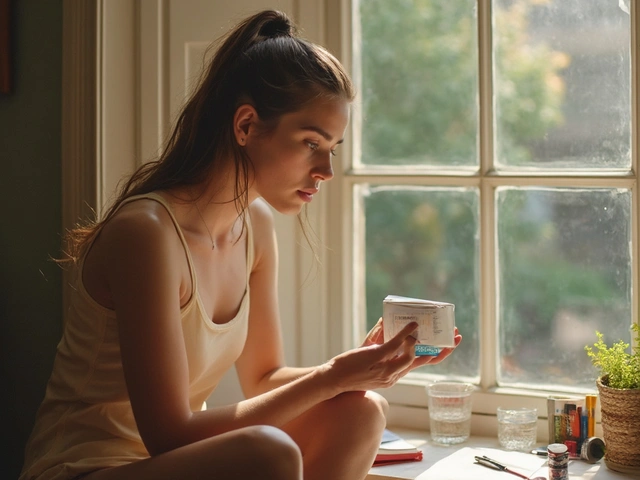When someone first whispers the word ‘Accutane’ in a conversation about acne, things get serious—fast. There’s no other acne medication that comes with the same mix of hype, hope, and horror stories. It’s hard not to get caught up in the before-and-after photos flooding social feeds or in the whispered tales of dry lips, nosebleeds, and those infamous birth defect warnings. Accutane divides opinion, but it’s impossible to deny: it’s the heavyweight champ in the acne world. The real question? What’s it really like to go on it, and how risky is it—especially when prescription after prescription has failed?
How Accutane Actually Works—and Why Doctors Don’t Hand It Out Like Candy
Accutane is the brand name most Aussies know, but its generic name is isotretinoin. It’s a form of vitamin A, but a much-pumped-up, superhero version that works very differently from your average supplement. This drug basically puts the brakes on the oil production in your skin. With less oil, there’s less for acne bacteria to feast on, and your pores become less likely to clog up. Sounds simple, but the effects go way deeper, even shrinking oil glands permanently in some cases.
The reason doctors treat Accutane almost like a last resort? Side effects. These aren’t just "I got a bit dry" problems. We’re talking about extreme dryness (think flaky lips that chapstick cannot touch), and some rare but serious risks like liver changes, increased cholesterol, joint pain, night vision problems, and—this is a big one—potential severe birth defects if someone becomes pregnant during treatment. In fact, women of childbearing age usually have to agree to using two forms of contraception and may need monthly pregnancy tests. The regulations feel strict because, well, the risk is very real.
But for all the caution, here’s a wild stat: between 80% and 90% of people who complete a full course (usually 4-8 months) see lasting improvement or complete clearing of their acne. There aren’t many other acne treatments that can boast that kind of success. Still, it’s not something you just pick up at Chemist Warehouse. You need regular blood tests and doctor check-ins to monitor any side effects. And you can’t donate blood during treatment, another random but true rule.
It’s not for mild breakouts or the odd pimple. Docs in Australia, like everywhere, usually only prescribe accutane when other stuff—like antibiotics, retinoid creams, and even hormonal pills—fail to do the job. It’s the nuclear option, and that’s why it works when nothing else does. But it also means you need to plan for life changes, like carrying lip balm and moisturiser absolutely everywhere, and possibly feeling a bit achy. Oh, and skipping the occasional wine, because your liver is already working overtime.
To give you a better idea of how Accutane stacks up, check out this data from a real-world Australian study published in the Australasian Journal of Dermatology (2023):
| Treatment Outcome | Percentage of Patients (n=412) |
|---|---|
| Clear/Almost Clear Acne | 86% |
| Moderate Improvement | 8% |
| No/Minimal Improvement | 6% |
These numbers explain why so many people make the leap, despite the horror stories. The odds are ridiculously good for a stubborn condition that steals confidence and dominates lives.

What Life on Accutane is Really Like: The Good, the Bad, and the Unexpected
Ready for a surprise? Not everyone experiences the side effects the internet loves to share. Sure, a lot of people get dry lips—like, peel-off-in-strips dry. But the rest is pretty individual. Some have achy joints, some get weird nosebleeds, and others glide through with only minor complaints. There’s also that skin sensitivity: think sunburn after 15 minutes outdoors and a strong need for sunscreen every. single. day. Moisturisers become your best mate, and a humidifier in the bedroom can be a lifesaver.
Mental health side effects are one of those heated topics. Some studies hint at mood swings or low mood during treatment, but there’s no slam-dunk proof isotretinoin directly causes depression. The dermatology community generally agrees you should watch for any mood changes and get support if needed, just in case. That being said, a lot of folks notice improvement in their confidence and social life as their skin clears up, which can be a massive boost emotionally.
Your daily routine will shift. First, forget waxing or laser hair removal—your skin will be too sensitive. Tattoos and piercings? Wait until you’re off it. And don’t even think about skipping your blood test appointments; your doc wants to make sure your liver, cholesterol, and triglycerides stay in check. There are stories of teens and adults who can recite the exact date of their monthly blood tests better than their own birthdays. Those check-ins aren’t just red tape—they’re genuinely for your safety.
Now, about your diet. You can eat pretty much everything, but high-fat meals can help your body absorb the medication. That’s right—greasy food isn’t off the menu, at least for the pills to work their best. But the real killer tips are way simpler:
- Buy multiple types of lip balm and stash them everywhere—bedside, bag, car, desk.
- Switch your face wash; gentle cream cleansers beat foaming or acne scrubs every single time.
- Double up on moisturiser and slather it onto your face, hands, and even arms or legs if needed.
- Drink more water than feels humanly possible.
- Don’t get lazy with sunscreen. SPF 50+ is your ticket.
- If nosebleeds hit, dab a little pawpaw (or petroleum jelly) inside your nostrils.
- Tell your mates so they know you’re not contagious—just on strong meds.
Some people get hit with an acne purge—a burst of breakouts in the first month. It’s rough but tends to fade soon after. Others see skin clearing almost right away. It’s a waiting game and, honestly, it’s different for everyone. Real talk: stick it out unless your doctor says otherwise, because quitting early usually means the acne will just come back for another round.

Navigating Life After Accutane: What Changes—And What Surprises Stay
So you’ve survived the dry lips, the moisturizer addiction, and the regular trips to the GP. What now? The finish line with Accutane actually marks the beginning of a totally different story for your skin. For many people, acne simply never returns. For others, it might come back but in a much milder form that responds better to other treatments, like topicals or antibiotics. Long-term studies show the relapse rate can hover anywhere between 10-30%, but most people won’t need another full round. If a second course is needed, dermatologists usually wait several months, and dosage gets carefully reconsidered.
Your skin stays noticeably less oily, sometimes for years. This bonus isn’t just cosmetic—fewer oil slicks mean blackheads and cystic breakouts are much less likely. It can feel strange, especially for people who’ve stocked up on oil-blotting sheets their whole lives. It’s also normal for scars to look more obvious at first (now that the acne is gone), but this actually gives you a shot at treating them—something impossible when breakouts are still raging. Laser, microneedling, or chemical peels? Those work best once the skin is settled and clear, usually about six months after the end of a course.
A common myth is that you have to tough it out for months on end before seeing results. Some see changes within weeks. Others, especially those with severe cystic acne, need the full 8-month course. Staying patient—yeah, sounds sappy, but this is one place where stubbornness is a plus.
Another surprise benefit? Most people lose that painful hypersensitivity that plagued them during treatment. You can get back into the sun (with sensible SPF) and return to normal activities. Skin also bounces back in resilience, making waxing, facial hair grooming, and everything else less of a hassle. But if your skin stays extra-sensitive or flushes easily, don’t stress—it happens, and derms have ways to help.
There’s also less stigma attached to taking Accutane these days. The internet is stacked with before-and-afters and honest reviews. Aussies have their own communities—Reddit threads, YouTube diaries, and local Facebook groups are packed with people sharing raw, real accounts of their journey. Old-school scare tactics about Accutane are fading away, helped by updated medical info and open talk about the risks and rewards. Even celebs have come clean about using it—think Lili Reinhart, Bella Thorne, and Kit Harington, who openly share their post-Accutane experiences. It’s no longer a ‘dirty little secret’.
The best tip? If you’re considering isotretinoin, talk to someone who’s actually done a course. Not a random influencer, but a mate or a real person who’s been there. Real stories beat scary internet myths. A dermatologist you trust is key—they’ll tailor your care, watch your labs, and adjust your plan to keep things smooth. If you get hit with side effects, they’ll have a plan, whether that’s lubricating eye drops, some tweaks to the dose, or switching up other meds.
If Accutane is on the table, take a breath. It’s not a magic bullet, but it’s about as close as skin science has come. The journey is worth it for people who’ve tried everything. It’s tough, but having the right info—and a good doc in your corner—gives you the best shot at skin you can finally forget about.




KJ Miller
June 15, 2025 at 11:26Accutane changed my life, no cap. 🙌 I had cystic acne since 14, tried everything-antibiotics, topical hell, even that weird blue light thing. Nothing worked. Started Accutane at 22, first month was brutal-lips like sandpaper, nosebleeds at 3 a.m., felt like I was dying. But by month 4? Skin looked like a different person’s. Now, 5 years later? Zero breakouts. Zero anxiety about mirrors. Worth every dry, painful, moisturizer-smeared day. Don’t let the horror stories scare you-do your research, listen to your derm, and trust the process. You got this. 💪
Claire Battista
June 16, 2025 at 05:50I was so scared to start it. My mom cried when I told her. But honestly? The worst part was the waiting. Not the side effects-the waiting for results. I thought I’d be stuck with flaky lips forever. Turns out, your skin just needs time to recalibrate. I started using a humidifier and stopped washing my face with soap. Game changer. Also, never skip the sunscreen. Even on cloudy days. Even indoors. I learned that the hard way. 🌞
Erin DeGroot
June 16, 2025 at 14:08There’s a quiet dignity in choosing to endure discomfort for long-term peace. Accutane isn’t just a drug-it’s a ritual of self-care disguised as medical intervention. The dryness, the blood tests, the social awkwardness of explaining why you can’t go tanning or get a tattoo-it’s all part of reclaiming your skin, your confidence, your right to exist without shame. Many dismiss it as a ‘miracle cure,’ but it’s really just science meeting stubbornness. And sometimes, stubbornness is the most powerful medicine of all. 🌿
Stephanie Bryant
June 17, 2025 at 03:05OMG YES the lip balm thing!! I had 7 different ones in my bag, car, purse, desk, nightstand-like a lip balm hoarder 😅 And the nosebleeds?? Pawpaw cream saved me. Also, don’t forget to drink water like your life depends on it-because your skin kinda does. I thought I was being dramatic, but after 3 months, my skin felt like silk. And no, I didn’t get depressed. I got *free*. 🙏 PS: My doc said if I got a headache or mood dip, to call ASAP-so I did. Always trust your gut + your doctor. #AccutaneWarrior
Drashti patel
June 17, 2025 at 15:05In India, we call it ‘the last resort’-but also, the quiet revolution. My cousin took it after 8 years of acne scars. No one talked about it. Now, she’s a dermatology student. Accutane doesn’t just clear skin-it clears the silence around it. People think it’s only for Westerners, but the science doesn’t care about borders. What matters is access, support, and not being shamed for needing help. I’m glad we’re talking more. Real talk > Instagram filters. 🌏✨
Kaitlin Crockett
June 18, 2025 at 07:41I did it. Two courses. Still clear. No regrets.